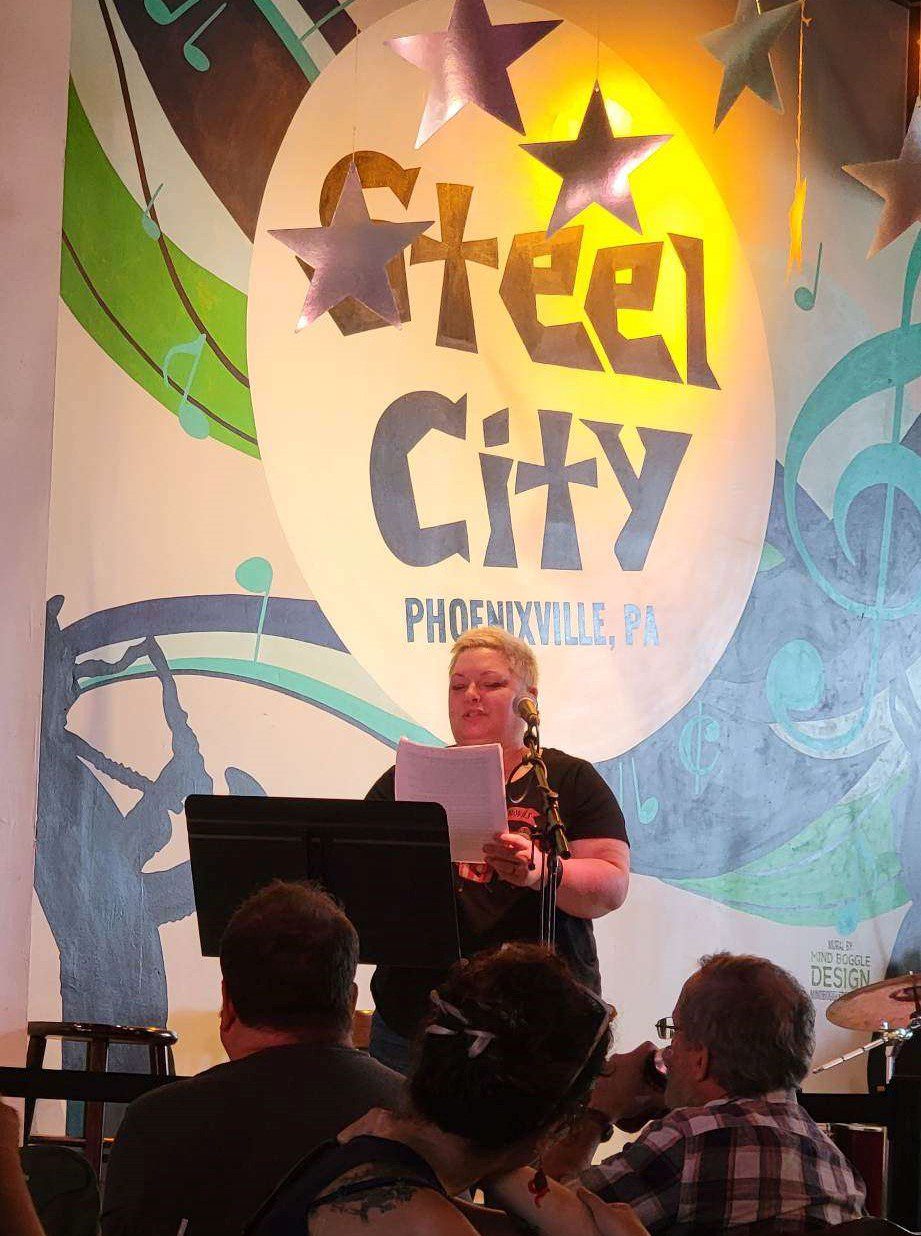Debate my flaws, please! Anytime I’m in front of a group of people, whether it’s a job interview or a work presentation, it always feels like that’s what I’m inviting people to do. And participating in readings of my work is often more uncomfortable–because it’s more than how I look or what I’m saying. I’m vomiting up–in public–the thing that is me. Deep down, under what I present as a public face… the things I write are my rawest self.
Now look–I write horror more often than not. I’m not saying there’s a murderer lingering in my deepest, darkest psyche. But often there’s an element of vulnerability embedded in my writing, and that’s not something I’m used to exposing. That’s probably true of most writers, and that’s probably why so many of us get agitated and nervous about reading in public. I am at least a little freaked before readings, but I’m fairly decent at faking competence and confidence once I get on stage.  I’d like to think I did a more than serviceable job last week at my Strong Women-Strange Worlds reading and at a surprise reading I had last night–my writerly colleagues at the PA chapter of the Horror Writers Association were reading at Steel City Screams (an event related to Blobfest!), and due to a last-minute cancellation, I was able to give a brief reading.
I’d like to think I did a more than serviceable job last week at my Strong Women-Strange Worlds reading and at a surprise reading I had last night–my writerly colleagues at the PA chapter of the Horror Writers Association were reading at Steel City Screams (an event related to Blobfest!), and due to a last-minute cancellation, I was able to give a brief reading.
I’m not the best, most dynamic reader imaginable… but I’m not terrible. I might lay claim to being entertaining, even! I blame cheerleading. No, really! I was a cheerleader for about a decade–throughout junior high, high school, and part of college. It’s an odd sport choice for a disillusioned punk-rock cynic with no school spirit, but I got to be loud and do jumps, stunting, and dancing… all things I enjoy and, for the most, am good at. While having a voice that projects well is useful, the things that cheerleading helped me with the most are a] not being afraid of an audience, b] pretending to be enthusiastic in a believable way, and c] accepting the likelihood of looking like an idiot in front of people. Hey, I once picked my wedgie on national television… it doesn’t get much more embarrassing than that.
Not every writer has a cheerleading background to fall back on for readings, so here are a few useful tips that have further helped me have a better performance–things I learned from writing speeches professionally, instead of my sports experiences.
- First and foremost, rewrite whatever it is you’re reading so it’s more suited to be read aloud. Most writers will just read from their book, or they’ll read a short story–without thinking about the experience from an audience perspective. Words on a page are often NOT optimized for speaking them aloud. Sometimes sentence structure is too complicated… or you trip over a phrase… or an audience doesn’t need to know something in that moment to enjoy or understand the excerpt.
- Secondly, practice reading the piece aloud. A lot. I like to record myself reading on Zoom, all by myself. I sit, I stand, I walk around–I read pieces one way, then another, trying to get the right cadence and flow. Tweak words, tweak emphasis. You should be able to read your piece without faltering… and you should be able to almost anticipate what’s coming next, which can really help if you temporarily lose your place. It’s like building muscle memory, except, well… actual memory.
- Lastly, when you’re prepping your finalized piece, insert cues for yourself. Breathe. Look at the audience. Smile. Grimace. Sigh. Pause. Whatever you need to remind yourself to be in the moment (or at least pretend) instead of nervous and tongue-tied and in your own head. I prefer size 18 font printed single-spaced when I read. My cues are highlighted so I don’t accidentally read them out loud if I get too nervous. Emphasized words are italicized and bolded. My pauses are marked with em dashes.
None of these things are going to turn you into a master public reader–but maybe you’ll feel less uncomfortable. And if you’re more comfortable, the reading will be better. That’s the goal, right?

